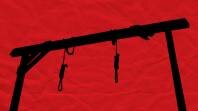Muhammad Iqbal was serving as a Naik, or corporal, in Pakistan Army and deployed on the Leepa Front in Azad Kashmir when he was suddenly picked up by an intelligence agency on Nov 27, 2004. He then disappeared for four years.
To this day, Iqbal, , one amongst thousands of people who have become victims of ‘enforced disappearances’, is not aware of the crime he committed and he has not been given an explanation why he was detained in solitary confinement and tortured for years.
Iqbal now lives in a two-bed room house in Falakan, a remote village in the scenic Neelum valley of Azad Kashmir. He has two children, Rohan, 5, and Rehan, 2 years old.
Bed-ridden, Iqbal suffers from faecal incontinence. Torture has left him immobile; in 2007, he was diagnosed with a case of caries spine and operated on. An iron rod was fixed in his spine. He is now unable to bend his body.
“They have destroyed my life for nothing,” Iqbal said, on a recent afternoon, referring to intelligence agencies.
The exact nature of charges remains a mystery. A military spokesperson did not provide any details on his case when approached by Pique.
Like most cases of enforced disappearances, Iqbal has a harrowing tale to tell. He claims he was initially kept in solitary confinement in Muzaffarabad Fort for about two years. “I was subjected to inhuman and brutal torture,” he says.
From Muzaffarabad, he was moved to a torture cell in Rawalpindi. He claims he was placed in a specially designer machine used for torture. It would increase pressure on his backbone, eventually breaking it down, he says.
His captors poured boiling water on his feet and pulled out his toe nails, he says. “They kept coercing me to admit any crime of my choice,” Iqbal said. “My refusal was taken an offense.”
Meanwhile, Khatoon Bibi, his wife, kept searching for the missing husband. She sent several applications to Commander 5 AK Brigade, General Officer Commanding 12 Div, the Corps Commander of the 10 Corps and Sector Commander of the Inter-Services Intelligence Directorate in Muzaffarabad. But it was all in vain.
“I was never informed anything about my husband’s whereabouts,” she said. “I was even threatened not to raise the issue with senior officials.”
She, however, remained persistent.
Finally, the Corps Commander of 10 Corps in Rawalpindi heard her plea. On March 28, 2006, she received a letter from the Corps Commander’s office. “Efforts are underway to locate your missing husband, and soon after would be intimated accordingly, the letter read.
By that time, Iqbal had been shifted to Kharian. It was becoming apparent on his captors that, despite the torture and intimidation, he would not accept any concocted charges, Iqbal says. He was produced before a military tribunal for Field General Court Martial. The prosecution, however, failed to bring any evidence to prove any charges against him. He was finally acquitted.
“My miseries did not end. I was still kept in a cell, despite being declared innocent,” he says.
Almost a year after the case against him was disposed off, Iqbal was thrown in front of his house in the dead of the night in 2008. He was soon informed that he had been retired ‘having been found medically unfit.’
Ironically, on his discharge book, military authorities wrote that he had an ‘exemplary character.’ He now gets a monthly pension but denied free medical treatment.
“It has added to my troubles,” he says. “I have to book an ambulance for Rs. 15,000 whenever I have to travel to Rawalpindi.” The added expenses have strained his financial condition. “I simply cannot afford proper medical care.”
Inamur Rahim, a noted lawyer who takes up cases of excesses of military authorities, says Iqbal has a legal right to get medical treatment at military hospitals.
Rahim says the military authorities have violated article 51 and 53 of the Army Act in the case of Iqbal. “The relevant personnel should be punished for negligence and destroying the victim’s life,’ Rahim says.
Rahim claims that more than two dozen cases related to illegal detention of army personnel are pending with civil and military courts for adjudication. He says that the authorities can get away with most of these cases by offering compensation to victims under article 59 of the Army Act that deals with civilian offenses.
The Pakistani Supreme Court has already taken up cases of enforced disappearances, to hold the authorities accountable for their violations of the law and human rights abuses.
The lack of accountability and sheer ham-handedness of the military authorities is a cause of concern, rights activists say.
“The military should hold trial of its personnel only in minor and disciplinary cases,” Zohra Yousaf, the chairwoman of Human Rights Commission of Pakistan, an independent watchdog, says. All other cases of serious nature should be brought under the purview of the civil courts.
“Cases of kidnapping and torturing innocent persons will keep taking place until the intelligence agencies are held accountable,” Zohra says.
Iqbal says the days of solitary confinement and torture during the years of captivity keep haunting him. Earlier this year, he wrote a letter to the General Headquarters through his lawyer to get a copy of the charges against him but has not received any response.
“They should have shot me dead during detention,” he says. “Death is better than this life of disability.”
The writer is a journalist based in Islamabad. He can be reached at [email protected]
























